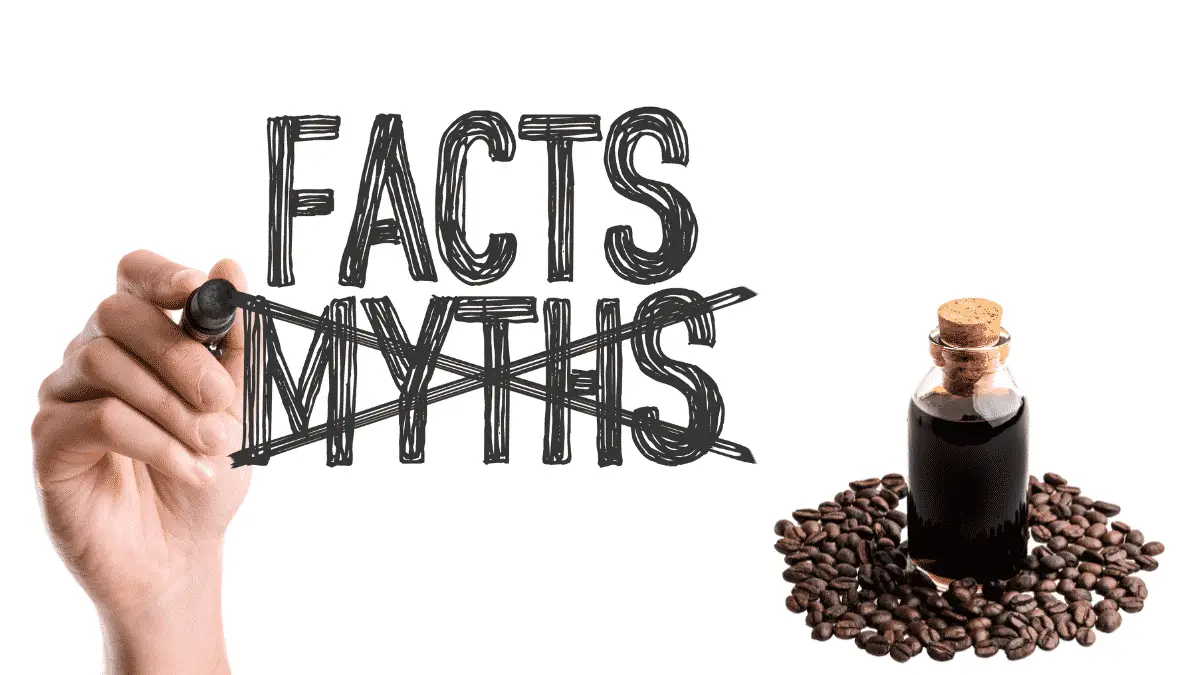Every new product that tries to disrupt the market is always followed by controversy. People need this controversy to justify the change. That’s what’s happening with cold brew coffee: it’s changing your daily routine, and you need something to help you feel comfortable with it. But today, I want to tell you the truth about cold brew coffee. I will reveal the 10 most frequent cold brew coffee myths and completely debunk them with logic and scientific data.
This list of 10 cold brew coffee myths contains the ones you’re daily reminding your friend and family. Since you started drinking cold brew, you were questioned or given the judgy look. In both cases, people were trying to steer you away from cold brew coffee. Since I’ve been there, I know how draining it can be to explain and kill these misconceptions. That’s why I created this list for you. From now on, you can direct anyone to this article who raises one of these myths as legitimate arguments. While they are educating themselves on our blog, you can enjoy a cold brew coffee in peace.
Let’s see what people think and what’s actually the truth.
1. Cold Brew Coffee Is An Invention Of The Xxi Century
The first busted cold brew myth is that cold brew coffee is a product of the XXI century. While it’s fascinating that cold brew coffee became popular only in the last decade, that doesn’t mean it’s an XXI century product. Records are dating back to the XVII century mentioning cold brew. These records actually point to Japan as the origin of cold brew coffee.
Japan was very protective of their culture in that period. The country was staying true to its foundations and culture. That often meant rejecting foreign products or tools. But Japan was also a trading route visited by the Portuguese and the Dutch traders in the XVI and XVII century. The later was credited with bringing coffee in Japan. In the 1640’s Japanese applied a cold tea brewing technique to the imported coffee. The result was cold brew coffee: the same we’re drinking today. We’ve already covered this topic in more detail in this article. Sorry GenZ and Millenials, but we aren’t the ones who invented cold brew coffee. But that doesn’t stop us from consuming and enjoying it many times every day.
2. Cold Brew Coffee Is Difficult To Make
Every change requires a bit of an adjustment. Changing a routine that became part of you. We often tackle these changes by creating a bubble or a myth to protect us from the change. In this case, the myth is: cold brew coffee is difficult to make. But once you learn the ratio and understand your expectations, you’ll realize preparing a cold brew is easy. Before you prepare your first cold brew coffee, you should be confident that you know all the basics. Besides getting a recipe, there are other factors to consider. That’s why we’d recommend you to explore our articles. A good start can be this article.
3. Cold Brew Coffee Is Stronger Than Espresso
I’m sure this myth is our own fault (the cold brew coffee consumers). Some of us have had the urge to justify why we’re drinking cold brew coffee when questioned. But in this case, we picked the wrong ‘battle’. Cold brew is not stronger than espresso. Here I’m not saying that espresso has more caffeine; thus, it is stronger. Instead, I’m saying that espresso’s TDS value (Total Dissolved Solids) is higher than cold brew. That’s making the espresso stronger. Calculating a coffee strength is a science per se (there are special tools that calculate TDS). That’s why we wrote an article to make it easy to understand for all of us. But make no mistake, cold brew is stronger than regular coffee and iced coffee. Unless you dilute your concentrate too much.
4. Quality Beans Are All That Matter For A Good Cold Brew
Every single guide or recipe out there emphasizes the importance of quality beans. On top of that, the ground beans (fine, medium, or coarse: read more about it here. While you can’t question those arguments, there’s a second ingredient in the cold brew coffee everybody is forgetting, and that’s water. The most significant part of cold brew coffee is water, which should discourage you from using water (don’t use tap water!). If you want to kickstart your day with a great cold brew coffee, you should find some quality beans. But don’t stop there: buy bottled water to use for your cold brewing process. These two are the foundations of a great cold brew coffee.
5. Cold Brew Coffee Can Last Up To 14 Days In The Fridge
Cold brew’s shelf life is my favorite misconception. People claim that you shouldn’t drink your cold brew after 7 or 14 days is based on personal views and not science. When I first researched the topic, I encountered the same information everywhere: up to two weeks. But there wasn’t any scientific explanation. The truth, in fact, was found in the work of Prof. Dr. Chahan Yeretzian. He’s a specialist in the field of Analytical Chemistry, Bioanalytical Chemistry, and Diagnostics. Dr. Yeretzian is also known for creating the first postgrad degree in coffee in the World. In one of his interviews, he confirmed that cold brew coffee can stay up to 60 days in the fridge. But since cold brew coffee shelf life is an exciting topic, we covered it in depth here. 6.
6. If There’s No Aroma It’s Not Good
We’re all coffee enthusiasts here, and we can’t blame people for this myth. You love that coffee aroma in the morning. It triggers some sweet memories. But aroma per se is not a factor to consider when you want to determine whether your cold brew coffee is still tasty. The aroma is a factor that represents freshness. A cold brew concentrate will pretty much have the same taste after one or two weeks in the fridge. While there will be a change in the taste, it’s negligent, and most of us will not notice it. But if you’re drinking an espresso, then aroma is definitely an essential factor to consider.
7. Caffeine Evaporates From The Cold Brew
This is a myth that is somewhat related to the shelf life of the cold brew. People are under the impression that caffeine evaporates. As such, they claim after a short period (1-2 weeks), it’s simply not going to be tasty. You’ll not feel that ‘kick’ of caffeine, because it’s simply not there. Well, this is a list of cold brew coffee myth-busting, so you know how this ends. Chemistry clarifies that caffeine is not water, and it doesn’t evaporate. So the amount of caffeine you had in your cold brew on day one is the same as on day 30.
8. You Have To Cold Brew Your Coffee In The Fridge
Cold brew coffee is such a versatile and resilient beverage. This is somewhat secondary to all its other qualities. You know, the ones that make us drink it daily. So if you want to prepare your cold brew at room temperature: you can. It can undoubtedly be cold brewed in the fridge, as this is the most popular method. But it can also be brewed using Kyoto Towers. These different techniques extract the coffee slowly and at low temperatures.
9. You Need Special Tools To Make A Great Cold Brew
We mentioned the Kyoto Tower already. But we also said that there are a few methods to prepare a cold brew. The most popular methods require any special items or ingredients. You need coffee beans, water, a kan, or a keg, and a towel to filter the cold brew concentrate. All these items are easy to come by, so you shouldn’t encounter any issue obtaining them.
10. You Can Only Drink Cold Brew Cold
Some people live in icy places all year long, but they drink cold brew. It’d be weird to see someone in Alaska drinking cold brew coffee at -20 degrees celsius. That’s why again, the cold brew versatility kicks in; you can heat up your cold brew whenever you want. You can do it by applying a couple of techniques. The only thing you need to be cautious is: not to over-extract from the coffee beans as this will make your coffee more acidic.
Cold brew coffee myths busted
Cold brew coffee is changing the landscape of the coffee market. This change brings challenges with it. Also, there are some unknowns around cold brew coffee, and we like to fill in the blanks to feel more comfortable. That’s where these myths fit in. While they are influential to a certain extent, myths will never last. That’s why I prefer facts and why I want you to learn more about cold brew in every post through science and logic. It goes without saying that busting these cold brew coffee myths is hugely satisfying.

